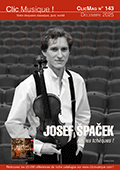 « Faire entendre la parole d'écrivains ayant subi l'exil, la prison et parfois la torture ». Tel est ici le propos du compositeur qui orchestre, dans tous les sens du terme, des matériaux de nature diverse — poèmes, témoignages, chansons — provenant de pays différents où l'homme a vu son humanité bafouée et niée. Ces textes deviennent le matériau d'un oratorio saisissant, qui rappelle A child of our time de Tippett, et est aussi un ample et vibrant protest song. L'acuité de l'œuvre se trouve renforcée par l'intelligence de sa construction : l'unité linguistique de l'ensemble (tous les textes utilisés sont traduits en anglais), l'inscription du chant dans des structures "traditionnelles" fortement codées (alternance soli/chœurs, formes telles que la fugue, la passacaille, le choral) intègrent et accueillent en effet, çà et là, comme en contrepoint ou en surimpression, la source originelle : voix enregistrée d'un tibétain lisant les premiers mots de son poème, accompagnée par l'orchestre qui introduit en même temps le chant de ce même poème en anglais par le baryton, ou — inversement — lecture de la traduction anglaise d'un folksong macédonien dont on entend l'enregistrement dans la langue originale. La transformation que la musique opère en donnant une portée universelle à des situations singulières est mimée par l’écriture même du compositeur. (Bertrand Abraham)  In 1992 I recorded a 15-year-old girl refugee in the Kalighat slum area of Calcutta. Her village had been destroyed by drought and she, like hundreds of thousands, lived on Calcutta’s streets. When her family left her village they had to walk for days and consequently could take none of their few possessions. All she could bring with her, she said, were her songs. For Kamla the songs were her link with her village, her past and her culture – they represented a part of her dignity. Although at the time I did not know it, I felt that one day I would write a work that would incorporate Kamla’s beautiful song and the stories of others like her. Thirteen years later the political debate on refugees and asylum seekers often seems to overlook the fact that these people are individuals, not statistics or political footballs. Voices of Exile makes no overt political point; it tries rather to give voice to a wideranging group of writers who have suffered exile, prison, sometimes torture, and who can give an insight into the shared experience of the refugee. It is an uncomfortable subject, yet one which, after being introduced to the work of the Medical Foundation and Prisoners of Conscience in 2000, I decided to make the theme of Voices of Exile.
 |
